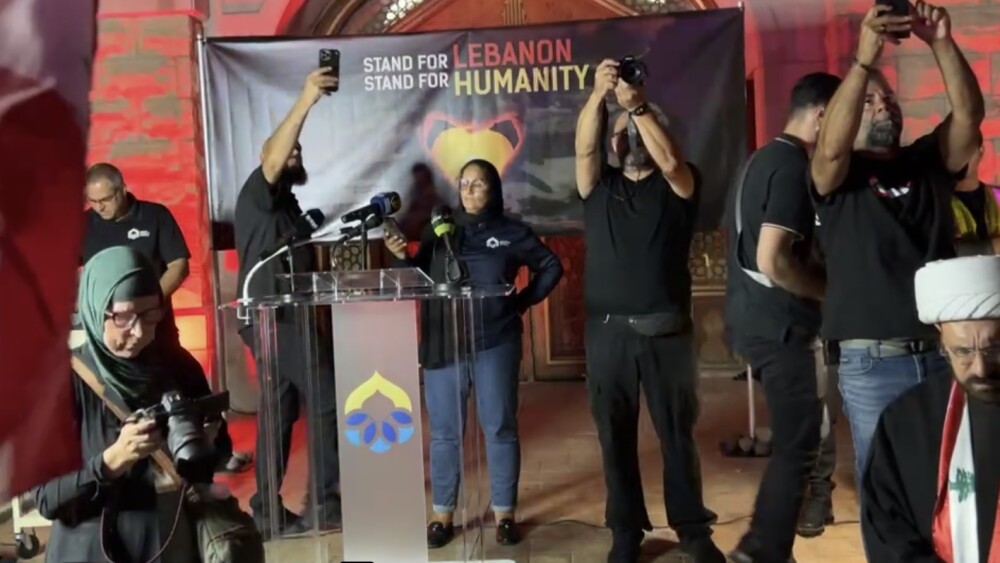
Congregants and leaders from the Islamic Center of America, a Shiite mosque located in Dearborn, Michigan, protest Israel’s successful efforts to defend itself from Hezbollah aggression from neighboring Lebanon. They offered their protests of Israel’s successful beeper attack at a memorial service held outside the mosque on September 20, 2024.
(Facebook screenshot)
A Shiite mosque in Michigan espoused Hezbollah talking points days after Israel’s September 17 beeper attack, which killed and injured more than 1,700 members of the terrorist organization responsible for the deaths of hundreds of U.S. citizens. Exiles who fled Lebanon to escape Islamist oppression have expressed shock that the Islamic Center of America (ICA) in Dearborn, Michigan, is carrying water for Hezbollah, a group responsible for the 1983 bombing that killed more than 241 U.S. Marines and for numerous kidnappings of U.S. citizens.
Former Lebanese journalist Maria Maalouf, who fled to the U.S. in 2019 to escape Hezbollah, condemned the ICA’s decision to hold a September 20 memorial service in response to the attack. “Given my personal experiences with Hezbollah, it’s deeply troubling to see any institution in the U.S. appearing to memorialize individuals connected to a group with such a violent and destructive history,” Maalouf stated.
“Hezbollah has caused immense harm, not only to Lebanon but also to the broader international community, including the tragic attack on the U.S. Marines in Beirut and the hostage crises that targeted Americans,” she added.
Video of the memorial service posted on Facebook indicates that speakers avoided direct references to Hezbollah in their speeches but instead claimed that the attacks against Hezbollah were an attack on Lebanon itself. Signs reading “Arab Lives Matter” were carried by mosque members.
An unidentified speaker at the service falsely stated that the attack was an “indiscriminate use of technology to cause harm to a population,” an allegation countered by Michael Doran, director of the Hudson Institute’s Center for Peace and Security in the Middle East. In a piece published on the Hudson Institute’s website, Doran praised Israel for successfully targeting Hezbollah operatives with so few civilian casualties, declaring that: “[T]hese are clean kills, as clean as one can possibly imagine in war.”
The ICA doubled down further on its propaganda in a social media post, declaring, “Our hearts are with the communities in Lebanon, where many communication device explosion attacks have taken the lives of innocent civilians and injured hundreds more; in Gaza, Palestine, who have endured nearly a year of relentless genocide, with countless lives lost, and in the West Bank, Palestine, where violence continues to be imposed on families.” Predictably, the post did not specify that the attacks targeted Hezbollah operatives.
Mohammed Elahi, a prominent figure with historical ties to Hezbollah, also condemned the beeper attack. Elahi, the imam at the Dearborn-based Islamic House of Wisdom, featured prominently during ICA’s rally following the attacks. During his Friday sermon, Elahi exaggerated the number of civilian deaths caused by the beeper attack. “The people that carry these pagers. Many of them are in the market and the restaurants,” he said, describing the victims of what he called “Israeli terrorism.”
Well-known counter-Islamist Dalia al-Aqidi, who seeks to oust U.S. Representative Ilhan Omar (D-Minn.) in the November 5 election, expressed outrage over the Dearborn mosque’s affirmation of Hezbollah talking points in the aftermath of the attack. Al-Aqidi, formerly a prominent news anchor in Beirut, fled Lebanon after receiving death threats from the organization in 2018.
“I was deported from Lebanon,” al-Aqidi said. “How long am I going to just keep taking it? We are too scared and too afraid of taking any action in the name of freedom. This is not freedom. This is purely terrorism.”
The situation highlights a broader issue of Hezbollah’s influence in the United States. A 2022 report by the Project on Extremism at George Washington University warns that, “While Hezbollah has not executed a successful terrorist attack in the United States, the group still attempts to develop the operational capacity to do so, and continues to use the United States as a financial and logistical hub to support its activities and operations around the world.”
Al-Aqidi worries that Hezbollah will recruit Americans to conduct attacks inside the U.S., including attacks against exiled dissidents. Hezbollah’s parent organization, the Islamic Revolutionary Guard Corps (IRGC), organized a hit in 2022 against dissident Masih Alinejad and threatened the lives of former Secretary of State Mike Pompeo and National Security Adviser John Bolton.
She worries Hezbollah could do the same in the U.S.
“I’m afraid for my life,” al-Aqidi said. “I feel that my government is failing to protect us.”
She continued: “The problem is that our lawmakers and our leaders support those who oppressed us and led us to flee our country. It’s so appalling … Iran is supporting all of these groups.”

